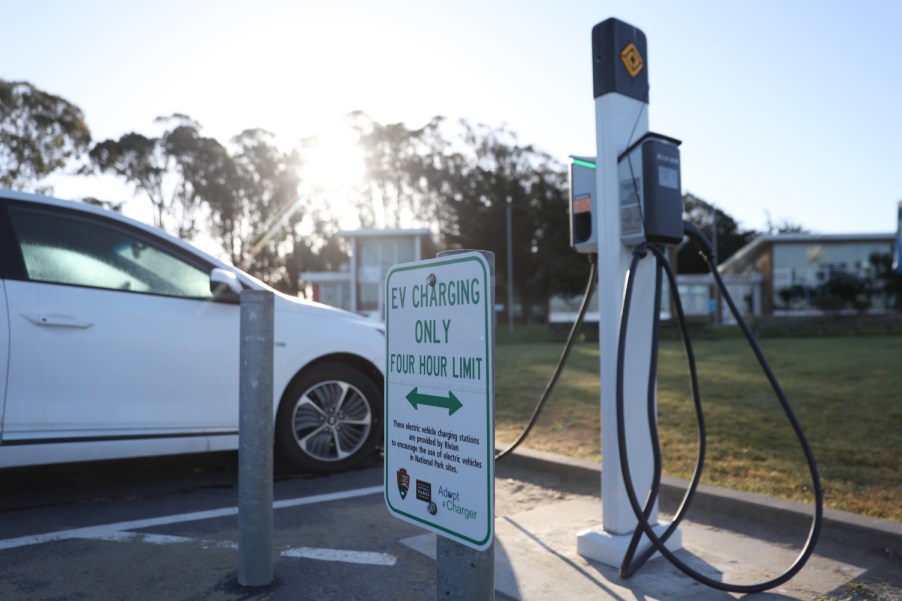
Do Electric SUVs Take Longer to Charge Than Electric Cars?
As more people make the switch to electric vehicles, questions about charging times are everywhere. How long does it take to charge a Tesla? How long does it take to charge an electric vehicle at home? Similarly, will an electric SUV take longer to charge than a car? That depends on the battery, for the most part. An electric vehicle with a longer range or a larger battery will take longer to charge.
How long does it take to charge an electric car or electric SUV fully?

Pod Point says the length of time it takes to charge an electric car or SUV depends on the charger and battery. It can be 30 minutes on some chargers and 12 hours on others. Typically, an electric car or SUV can get a full charge in under eight hours using a 7kW charging point.
A slow charging speed is typically around 3.7kW. This is one of the slowest charging methods available and is usually just utilizing a regular wall outlet. This works in a pinch or for those who might have brought the electric vehicle home that day. Most people will opt for a home charger at that point, which can charge your EV fully in about four to eight hours.
Charging speeds range from the slow 3.7kW and 7kW mentioned before to 50kW and 150kW chargers. A 50kW charger is considered a rapid charger. Charging will take anywhere from 30 minutes to two hours to fully charge an EV for the most part. These fast chargers can also be known as DC Fast Chargers. A 150kW rapid charger will get the job done in under an hour. 30 minutes is typical to get drivers in and out.
The bigger the battery on the electric car or SUV, the longer it will take to charge
The larger your electric car or SUVs battery is, the longer it will take to charge. Similarly, the larger the battery is, the longer the range. For instance, take the Tesla Model 3. The rear-wheel-drive Model 3 with a standard range has a 60 kWh battery that takes 6.5 hours to charge fully. The all-wheel drive version, known as the Model 3 Long Range, has a 62 kWh battery. That takes about 7.5 hours to charge fully. The newer version of the Model 3 Performance has an 82 kWh battery pack that charges in 6.5 hours.
Most manufacturers have a larger battery pack option to help owners charge less. So if your electric SUV has a larger battery pack than a car, it will take longer to charge under similar circumstances. When it comes down to it, though, an electric vehicle with a longer range will take longer to charge, no matter the type of EV. A typical electric car with a 60kWh battery takes about eight hours to charge on a regular 7kW charger.
Something like the 2022 Lucid Air Dream Edition has a very larger battery to accommodate its long range. The 118 kWh battery offers a range of 471 miles. Car and Driver says it is one of the fastest-charging cars on the market. “At a 350-kW Electrify America charging station, it recharged its 118.0-kWh lithium-ion battery pack from 10 to 90 percent in 46 minutes.”
Where you charge your EV matters
A regular outlet will be the slowest charging for an electric car or electric SUV. An installed home charger will get faster charging, which many owners opt for. This is because most home chargers have an app or some scheduling option so that charging can take place when electricity costs less. Fast charging isn’t as necessary because most owners will wake up to a fully charged car.
A supercharger, such as a Tesla Supercharger station, is meant to get drivers in and out quickly. The locations of these chargers are usually in high-traffic areas or near highways. Stop in for 30 minutes and be on your way with a full charge.
In conclusion, there are a lot of variables that can impact how long it takes to charge an electric car or electric SUV. A bigger battery means more range and more time at the charger. An older battery might have similar implications, like when your old laptop holds a charge for a shorter amount of time. A new EV with a new battery will charge up quickly and get you back on the road. The best source for exact charging times will come from the manufacturer upon release.



